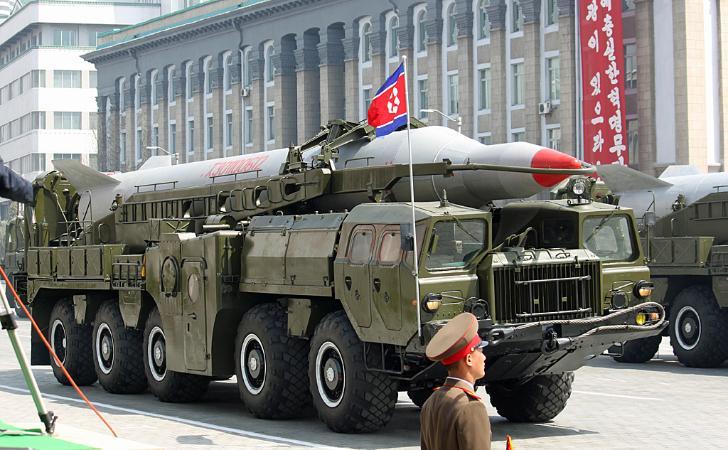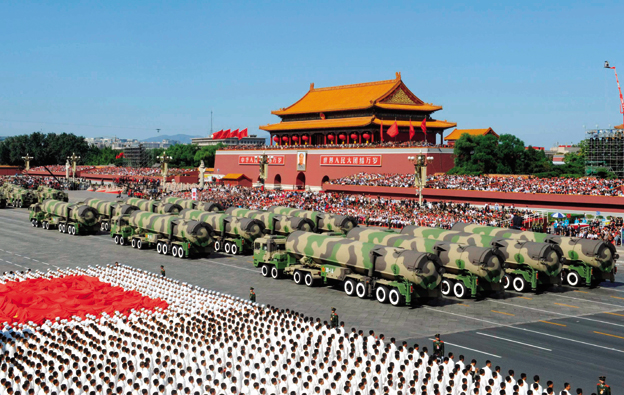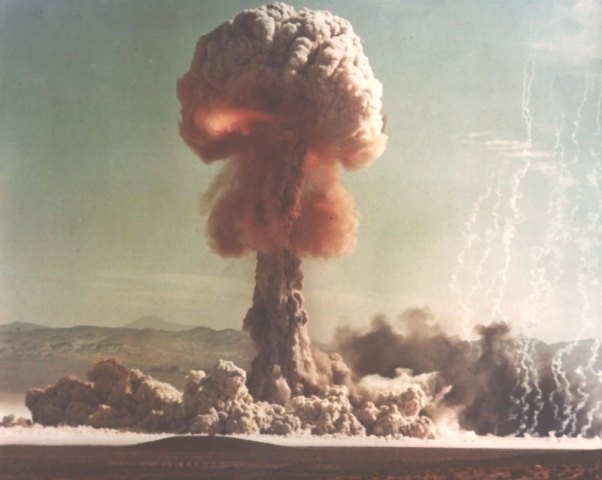ROK-Japan cooperation could yield formidable upgraded nuclear weapons
North Korea’s nuclear weapons are a truly serious problem for the Republic of Korea (ROK) in the South and a headache also for the United States, China, Japan, Russia and other countries with interest in the Korean peninsula.
Some experts on inter-Korean relations compare North Korea to a lion in the old tale which has two sharp canine teeth and which wants to marry the daughter of a farmer. The farmer tells the lion that it cannot marry his daughter unless its two canine teeth have been removed. However, the lion suspects that the farmer would beat it out of the house if it has no canine teeth and that if this happens the lion will lose both the farmer’s daughter and the canine teeth.

So the confrontation continues between the ROK and North Korea like the lion and the farmer.
A leading Korean-language newspaper, Chosun Ilbo, has recently introduced Professor Han Soon-ki of Yonsei University (a member of the Korea Institute for National Unification) who has published a scenario which might help in having the lion’s canine teeth removed.
According to Professor Han’s scenario, the so-called ‘Sunshine Policy’ of the ROK, which gave much economic assistance to North Korea without any condition, has not worked. He also said that the hardline policy against North Korea has not worked either. He suggests the use of ‘Stick and Carrot’ tactics. The ROK and the US should use strong punitive measures against North Korea’s development of nuclear weapons and military provocations on the one hand, and, on the other, they should seek ways to solve the problem through dialogue. Prof. Han believes that this two-way method could encourage North Korea to eventually give up its nuclear weapons development.
However, many experts believe that the problem of North Korean nuclear weapons will not be solved without the support of China and Russia and that it is problem also related with the security of Japan.
Especially for China, the North Korean nuclear development is a very serious problem because the situation could instigate South Korea and Japan to develop their own nuclear weapons to defend themselves from the nuclear blackmailing by North Korea.
China has the strongest and most effective measure of influence and control on North Korea because North Korea is over 90% dependent on China in trade and various other areas, including military support and economic assistance.

The ROK can make 100 nuclear bombs in 2 years
At this juncture, reports have recently been published in Seoul that South Korea could make 100 nuclear bombs in two years if it really wanted to and that if the ROK and Japan should cooperate in the nucear weapons development to defend themseleves from the North Korean nuclear attack they could make formidtabvle upgraded and sophisticated nuclear weapons that could pose a real threa to China.
The reports say that in this situation the US has nothing to lose. In fact, the US turned a blind eye to India when it developed nuclear weapons that played the role of containing China. A similar reponse has also happened to Israel and Pakistan when they developed nuclear weapons without ‘advertising’ it to the outside world.
Then came reports that South Korea ranks 10th in the world in nuclear armament capabilities and that it can make 100 nuclear bombs within two years if the country is compelled to do so in the face of increasing North Korean threats and intimidations of a nuclear attack.
It was disclosed by Prof. Seo Kyun-ryeol of Seoul National University, who specializes in atomic and nuclear engineering, which was published by Korean-language Weekly Chosun on May 19, 2015.
Earlier on May 4, 2015, another leading Korean-language news media, Joongang Ilbo daily, said that there are strong possibilities that South Korea might make nuclear bombs if the security situation worsens due to North Korean nuclear blackmailing.
Their reports are based on a report published by President Charles D. Ferguson of the Federation of American Scientists at a nuclear scientists’ meeting in Washington D.C. on April 27, 2015.

Entitled “How South Korea could acquire and deploy nuclear weapons” with an introduction (Why studying options for nuclear weapons is necessary to prevent further proliferation), the Ferguson report also cites the views of the prominent political leaders in Korea advocating the ROK’s nuclear armament such as former Chairman Chung Mong-jun of the ruling Saenuri Party and the opinion survey results in the ROK showing 65% of the people supporting the ROK’s nuclear armament: Here are excerpts from the Ferguson Report:
How South Korea could acquire and deploy nuclear weapons
Introduction: Why studying options for nuclear weapons is necessary to prevent further proliferation
Political leaders and defense planners in the Republic of Korea (ROK), or South Korea, are cognizant that worsening security in Northeast Asia could lead to additional states, including the ROK, to consider and even develop nuclear weapons. In particular, Korean President Park Geun-hye warned in May 2014 that another nuclear bomb test by North Korea (Democratic People’s Republic of Korea or DPRK) would be “crossing a Rubicon” and would make it “difficult for us to prevent a nuclear domino from occurring in this area.”1 She mentioned that there are some leaders in minority political parties in the ROK discussing options for South Korea’s acquisition of nuclear weapons. But the preference is still strongly for the ROK to rely on extended nuclear deterrence from the United States and for the ROK Armed Forces to improve their conventional military capabilities in cooperation with the United States. Nonetheless, if the Japanese government decides that it must acquire nuclear weapons, which would also be far from Japan’s preference, the ROK would feel pressure to follow Japan. Thus, while South Korea would not be first to acquire these weapons, it would not want to feel vulnerable to a nuclear-armed Japan.

Often nonproliferation analysts avert their gaze and do not want to contemplate too deeply how trusted allies such as South Korea or Japan could plausibly develop nuclear arms. However, to prevent an awful event, it is useful to study how the external geopolitical and internal domestic political circumstances could transpire to lead to this event and then to examine the consequences if such an action were to occur. This technique of “negative visualization” has a long and distinguished history, having been practiced by Stoics such as the Roman Emperor Marcus Aurelius, in identifying what the practitioners can do and control in order to reduce the likelihood that tragic “Rubicon”-crossing events would happen. President Park herself proposed in an op-ed for the Wall Street Journal, a “Northeast Asian Peace and Cooperation Initiative” for China, the ROK, and Japan to work together to resolve the region’s “many quandaries.”2 Moreover, the ROK needs to continue to work closely with alliance partners to strengthen non-nuclear defense options, and the United States needs to continue to provide nuclear deterrence commitments to the ROK.
Rationales for South Korea to consider acquiring nuclear weapons
Faced with growing threats of nuclear weapons and missile capabilities from North Korea, South Korea clearly needs reliable means to deter the North’s nuclear weapons and effective responses if deterrence fails. Would South Korea develop nuclear weapons to provide deterrence and response capabilities? Different political factions in South Korea have at times doubted U.S. nuclear deterrence assurances or have wanted their own nuclear capabilities to provide for credible deterrence. Other factions have in contrast argued for reconciliation with North Korea and pushed for creating a peninsula free of nuclear weapons.
Reasons against South Korea acquiring its own nuclear weapons can look compelling, but a different viewpoint on these reasons can argue for South Korea crossing that threshold. Let’s examine a few prominent reasons for and against.
First, South Korea has become one of the most globalized nations in the world with one of the largest economies, supplying coveted goods (such as electronic products made by Samsung and LG Corporation) to markets around the world, especially to the United States. This argues against South Korea acquiring nuclear weapons because it would jeopardize its economy due to the resulting international sanctions. On the other hand, South Korea would most likely weather the storm of sanctions considering the precedent of India. In May 1998, India conducted nuclear explosive tests and was then sanctioned. But the sanctions did not last much longer than a year. While India was not producing many coveted goods at that time, its huge population offered an enticing market and, as a democracy, was seen by the United States as an important counter to communist China’s rising military strength. In the case of South Korea, it has a tiny population compared to India, but most of its people are relatively wealthy and take part in a vibrant democracy, and as mentioned, many South Korean companies create goods that Americans want to consume. Thus, the sanctions would likely be pro forma and be removed after a period of a few to several months.
Second, South Korea has positioned itself as one of the stalwart defenders of the nuclear nonproliferation regime. South Korea, for example, has applied the Additional Protocol to its Comprehensive Safeguards Agreement and thus opened up its civilian nuclear program to intensive inspections by the International Atomic Energy Agency (IAEA). Also, Seoul hosted the 2012 Nuclear Security Summit and demonstrated leadership in securing nuclear and other radioactive materials. Moreover, South Korea would not want to risk sanctions on its ability to export nuclear technologies because it has pledged to garner 20 percent or more of the future nuclear export market, estimated to be worth more than $100 billion in the coming decades. The flipside, however, states that the nonproliferation regime is only good as long as it serves South Korea’s national interests. If the Republic of Korea’s government determines that its national security requires developing nuclear weapons, it can cite Article X of the Non-Proliferation Treaty (NPT) to exercise its right to leave the treaty in 90 days, similar to what North Korea did in 2003. As to sanctions on nuclear exports, South Korea has smartly embedded its nuclear industry with the United States, France, and Japan, to name a few prominent partners. If these countries want to continue to benefit from partnership with South Korea in the United Arab Emirates or other countries where South Korea has negotiated deals, they would not press too much or hardly at all for sanctions that would also hurt themselves.
Another argument against South Korea’s obtaining nuclear weapons is that the ROK would rupture its defense agreement with the United States as well as spark a potential nuclear arms race with Japan or perhaps China. This may be the most powerful argument impeding South Korea’s acquisition of nuclear weapons, but there are plausible ways in which it could still happen. Despite the U.S.-stated strategic pivot to the Asia-Pacific region, the fiscal reality is that the United States is increasingly hard pressed to meet the levels of defense spending required to shore up the security of Japan and South Korea. Also, some current and former leaders in those two countries have perceived the Barack Obama administration as downplaying the utility of nuclear weapons, and President Obama’s call for a world free of nuclear weapons has alarmed some defense analysts in Japan and South Korea. If the United States were perceived to not be able to reliably and credibly counter the threats posed by China and North Korea, prudent military planners in Japan and South Korea would want to take steps to have their own nuclear capabilities. Moreover, some ROK officials might rationalize that acquiring nuclear weapons would wake up the United States to the need to work more seriously with the ROK on security matters, namely the denuclearization of North Korea.
Finally, if Japan crosses the threshold to nuclear weapon acquisition, South Korea would feel compelled to follow suit. South Korean leaders would then not want to be vulnerable to both nuclear-armed North Korea and Japan. Imperial Japan subjugated the Korean people to colonial rule from 1910 to 1945, and many South Koreans still feel bitter animosity toward Japan and want to prevent Japanese incursion onto Korean territory or into Korea’s national interests.
Scenarios for South Korean acquisition of nuclear arms
Let’s consider three scenarios that would lend South Korea the means to deter, counter, and respond to nuclear threats. The first scenario will be called “enhanced status quo” because it will show that the current status quo has already resulted in South Korea having delivery systems such as missiles and aircraft for nuclear weapons and having a relatively large civilian nuclear infrastructure that would only need to be enhanced a bit to provide the means to extract fissile material for weapons and deploy the first nuclear weapons on available delivery systems. This scenario posits that South Korea would first stockpile separated reactor-grade, but still weapons-usable, plutonium (Pu) and proceed with enhancing its means to produce larger quantities of weapons-grade or near-weapons-grade plutonium for a potential major breakout if necessary. In parallel to the initial amassing of separated plutonium, the ROK would continue to improve its ballistic and cruise missile systems and perform development and testing to ensure that these systems are nuclear capable. Once South Korea has at least a few bombs’ worth of plutonium and has confidence in its missile systems, it could go for a quick breakout that would most likely be used to signal North Korea, China, Japan, and the United States. One plausible purpose of this signaling of these initial “diplomatic” bombs would be to prod Washington as well as Beijing to engage seriously on the denuclearization of North Korea.

If the United States and China failed to act, if Japan acted to breakout or build up its nuclear arsenal if it had already broken out, or if North Korea took steps to increase its nuclear arms, South Korea could leverage its base of a handful of nuclear bombs to keep ratcheting up and implement its potential to make dozens of nuclear warheads annually from near-weapons-grade plutonium produced from its four pressurized heavy water reactors (PHWRs). The initial steps could take place conceivably within a five-year period, and the latter ramp up might require more than five years from the initial start. South Korea would try to do as many preparatory steps in parallel. It would need to be prepared for relatively rapid buildup because of the uncertainty concerning how the other states might respond.
In the second scenario, “encirclement,” which would build on the first scenario, South Korea would need to ratchet up its nuclear capability to deal with nuclear threats from Japan and China as well as North Korea. In particular, the assumption is that Japan has obtained nuclear weapons and is threatening both North and South Korea. Also, although Seoul and Beijing have good political and economic relations, South Korea wants to prevent China from occupying the North in the event of a regime collapse or some catastrophe that would give the People’s Liberation Army (PLA) a rationale to cross the Yalu River. Seoul would perceive nuclear weapons as a way to deter Chinese incursion into the Korean Peninsula. Beijing’s top priority in the region is stability in the Korean Peninsula because of its concern about a mass exodus of millions of North Korean refugees into Chinese Manchuria. In this encirclement scenario, South Korea would likely perceive the need for longer-range strategic nuclear weapon systems and battlefield-capable tactical systems.
In the third scenario, the wild card will be that Japan and South Korea actually join forces and cooperate against common foes. This scenario could be called “the enemy of my enemy is my friend.” Working together, Japan and South Korea could climb the ladder to advanced nuclear weapons faster than their separate efforts. They would aim to counter China and North Korea. The United States might actually welcome such a nuclear alliance because this could reduce the U.S. defense burden, but on the other hand, Washington would worry that this scenario could lead to more aggressive conventional and nuclear arms races in Northeast Asia and a more militarily capable China. Without a doubt, this scenario would result in a major strategic realignment.

